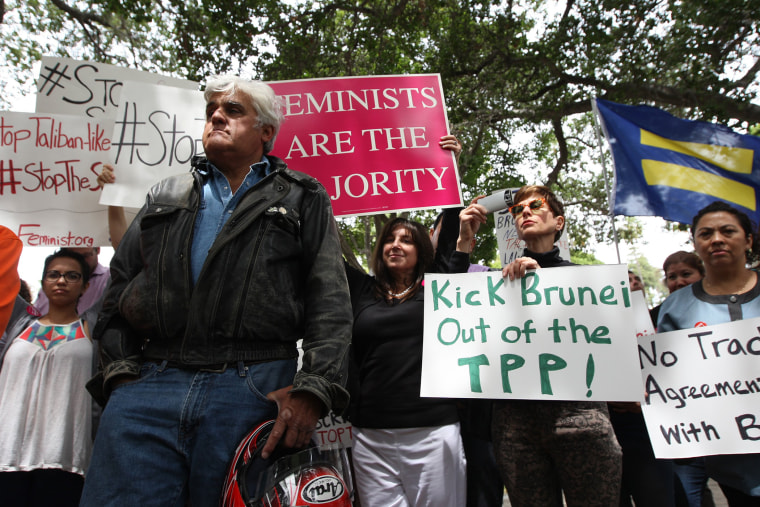Outraged over Brunei’s newly-enacted penal code that will soon allow death by stoning for “crimes” including gay sex, the Beverly Hills City Council is slated to consider a resolution Tuesday evening calling on the Southeast Asian country to divest its ownership of two Los Angeles hotels, which have become the target of a growing boycott.
Nine events have been canceled so far at the historic Beverly Hills Hotel, which -- along with the Hotel Bel-Air -- is owned by an arm of the Brunei government. Last week, Sultan Hassanal Bolkiah began phasing in a Sharia-based penal code that will soon add the oil-rich nation to a list of seven other countries with the death penalty for sex between gay people. Brunei will also implement flogging and amputation of limbs as possible punishments for crimes such as rape and adultery.
Dozens staged a protest along Sunset Boulevard Monday, calling for a widespread boycott of the hotels owned by Brunei until the country either cuts ties with them or reverses its draconian penalties. The Motion Picture & Television Fund said it wouldn’t hold its annual Night Before the Oscar party at the Beverly Hills Hotel as it has for many years, while the Hollywood Reporter, Feminist Majority Foundation, and Richard Branson’s Virgin Group made similar pledges. Celebrities such as Ellen DeGeneres, Sharon Osbourne, and Jay Leno lent their support as well, either in person at the protest, or through social media.
“What year is this?” said the former Tonight Show host during Monday’s demonstration. “What is this, 1814? Come on people, it’s 2014.”
Christopher Cowdray, chief executive of the Dorchester Collection which operates the L.A. hotels, told the Los Angeles Times that boycotting was a misguided response -- one that could potentially hurt employees who rely on tips, and derail millions of dollars that the hotels pump into the city’s economy.
“They won’t stop the implementation of the new laws,” he said of the protests. Cowdray also told the San Bernardino County Sun that the hotel chain was an autonomous company with a strict code of conduct that calls for equality, despite its owner’s view on the subject.
Ahead of Tuesday’s resolution vote, the chorus of condemnation against Brunei and its property grew louder. City Attorney Mike Feuer announced in a press release that he would “not set foot in either the Hotel Bel Air or Beverly Hills Hotel until this issue is resolved,” and welcomed other Angelenos to join him. Meanwhile, the Human Rights Campaign also called on the two hotels to cease their promotion of specialized services to LGBT couples, which the group’s president called “the height of hypocrisy” in a statement.
“The Sultan is offering free strawberries to LGBT couples in L.A. and death by stoning to those in Brunei,” said HRC President Chad Griffin.
It is unclear whether the growing Western backlash will have any impact on Brunei’s leader, who is worth an estimated $20 billion, according to Forbes, and has called the new penal code “a great achievement.” In addition to the Los Angeles hotels, the Dorchester Collection also operates several establishments in Europe, none of which are facing the same type of response.
Threatening business interests in Arizona proved to be an enormously effective strategy in scuttling that state’s religious liberty bill, which would have made it easier to discriminate against gays and lesbians. But when Russia passed a series of anti-gay laws last year, calls for a global boycott of vodka didn’t turn out to be quite the same shot to the jugular. The #DumpStoli campaign was a far milder response than what many opponents were pushing for -- which was a boycott of the 2014 Sochi Olympics -- and created confusion by targeting Stolichnaya vodka, which is produced by the Luxembourg-based SPI Groupin Latvia, not Russia.
